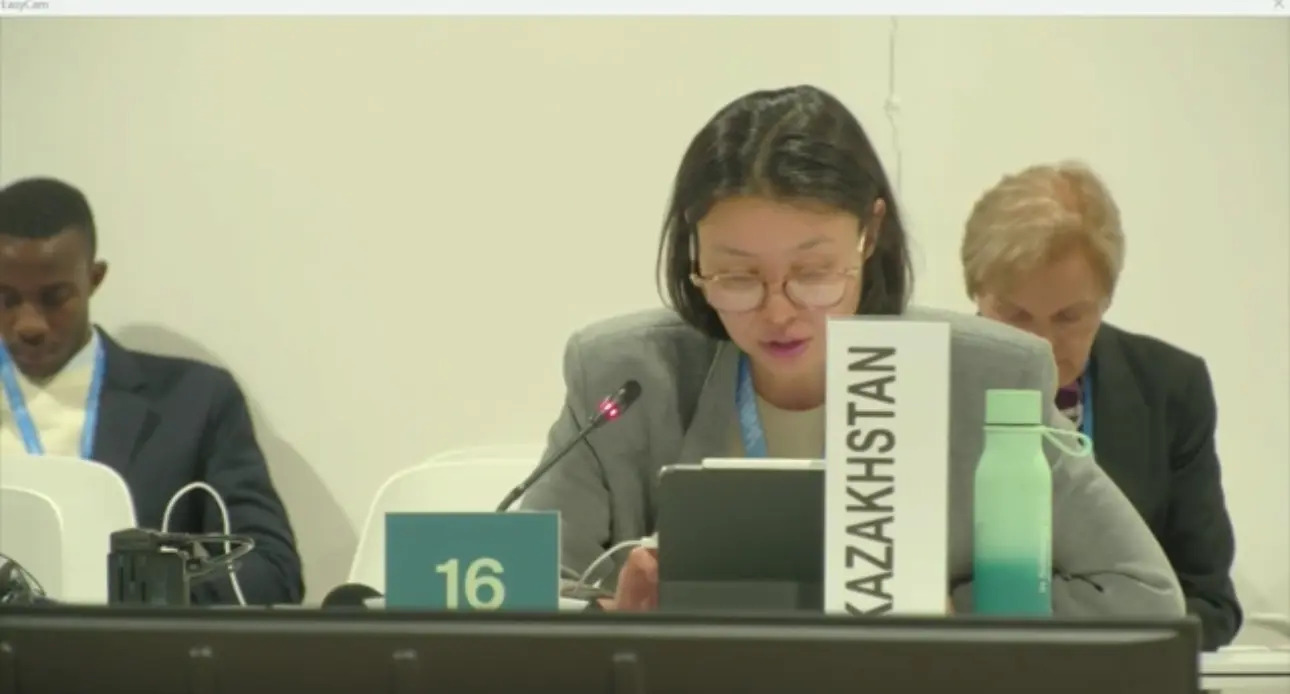BAKU – Zulfiya Suleimenova, the advisor to the President of Kazakhstan – Special Representative of the President on International Environmental Cooperation, stressed the importance of transitional finance at the sixth High-Level Ministerial Dialogue on Long-Term Climate Finance on Nov. 14 at the 29th United Nations (UN) Climate Change Conference (COP29) in Baku.

Zulfiya Suleimenova. Photo credit: UNFCCC
Transitional finance provides funding to help industries and businesses shift from high-carbon practices to sustainable, low-carbon operations, focusing on hard-to-decarbonize sectors. It bridges the gap to a green economy by supporting gradual transitions while addressing social and economic impacts.
“Climate finance, especially when aligned with the principles of NCQG [New Collective Quantified Goal], is much more than a sum of funds. It represents our commitment to collectively address the vulnerabilities of developing nations and transition towards a sustainable future. Kazakhstan, like many landlocked developing countries, is highly exposed to climate risks, which affects key sectors such as infrastructure, food security, and water resources,” said Suleimenova.
She called for predictable and accessible climate finance that simplifies processes and responds to evolving climate challenges, enabling nations to implement their NDCs effectively.
“We, therefore, urge that climate finance considers these unique challenges and supports countries that face disproportionate climate impacts. Achieving long-term decarbonization, particularly in carbon-intensive sectors, requires access to transitional finance that enables countries like Kazakhstan to shift towards cleaner energy sources without hindering economic development,” she said.
The Kazakh official pointed out several factors that must be in place for climate finance to have a substantial impact.
“It should be predictable, easily accessible, and adapted to the diverse needs of developing nations, including middle-income countries. This requires simplifying financial processes, also for LDCs, and ensuring that financing frameworks are responsive to changing climate challenges. By doing so, we can enable nations to implement their NDCs more effectively and with greater confidence in the financial support available to them,” said Suleimenova.
Kazakhstan views climate finance as deeply interconnected with the broader international financial architecture. Climate finance should go beyond just addressing climate threats and prioritize resilience and inclusivity. Suleimenova suggests this is the “most cost-effective and sustainable pathway to achieving shared climate and development goals.”
“Such an architecture would provide the foundation for climate and transition finance that supports both immediate climate goals and broader development needs,” she added.
Predictable funding, concessional finance, and grant mechanisms, she noted, are crucial for building resilience, enhancing energy security, and achieving the country’s NDC targets without compromising economic growth. “Kazakhstan believes climate finance should serve as a catalyst for change, empowering all nations, particularly those most vulnerable, to thrive in a low-carbon, resilient world,” she added.
Negotiating a new climate finance target is a top priority of this year’s COP29. The hope is to replace the target set in 2009 when developed countries pledged to provide $100 billion annually by 2020 to developing countries to address climate change.
The deadline, however, was missed by two years. On top of that, way more than this amount of funding is needed to cover the fast-evolving consequences of climate change, according to the United Nations Environment Program (UNEP).
COP29 comes after the release of the 2024 UNEP Emissions Gap Report, which warns that without more robust efforts to reduce greenhouse gas emissions, global temperatures could rise by 2.6 degrees Celsius to 3.1 degrees Celsius this century—levels that would have severe impacts on the planet. The report highlights that countries need to cut emissions by 42% by 2030 to keep global warming within 1.5 degrees Celsius above pre-industrial levels, a key target of the Paris Agreement.
Addressing the ministerial dialogue, Simon Stiell, the executive secretary of the UN Framework Convention on Climate Change (UNFCCC), said the overall trend in climate finance flows to developing countries is increasing.
“More finance is flowing to adaptation projects. More finance is flowing in the form of grants, as well as loans. But there are important lessons learned on improving transparency, access, and affordability,” said Stiell.
“We need to use these spaces not to finger point but to push forward on the ways access to finance can be improved. Finance can be made more affordable in the midst of several fiscal constraints and debt crises. More innovation and resources can be tapped to assist developing countries,” said the UN official.
A report released on Nov. 14 from the Independent High-Level Expert Group on Climate Finance at COP29 said countries need to mobilize at least $1.3 trillion a year by 2035 for climate action.
“Any shortfall in investment before 2030 will place added pressure on the years that follow, creating a steeper and potentially more costly path to climate stability. The less the world achieves now, the more we will need to invest later. Delayed action means we will need to mobilise even larger sums in shorter time frames to catch up on critical targets. Additionally, investment needs for adaptation and resilience, as well as loss and damage and restoration of nature, will rise sharply as climate and nature risks escalate,” says the report.
Kazakhstan is also among the first nine countries to submit the Biennial Transparency Reports (BTRs) under the Paris Agreement, a key component of the Enhanced Transparency Framework that countries must submit every two years and that shows their progress in reducing greenhouse gas emissions, meeting climate goals, and adapting to climate change. The report also includes details about financial or technical support countries give or receive.
Besides Kazakhstan, other countries, which Stiell described as “frontrunners” and “champions of transparency globally, setting a powerful example for other countries,” include Andorra, Guyana, Panama, Japan, Spain, Türkiye, the Netherlands and Singapore.
“They [BTRs] are vital enabling tools for governments and businesses, helping to build a robust evidence base critical to strengthening climate policies and climate action. Because transparency is about so much more than reporting, as important as that is. It’s about learning and refining our strategies to achieve our goals,” he said.
